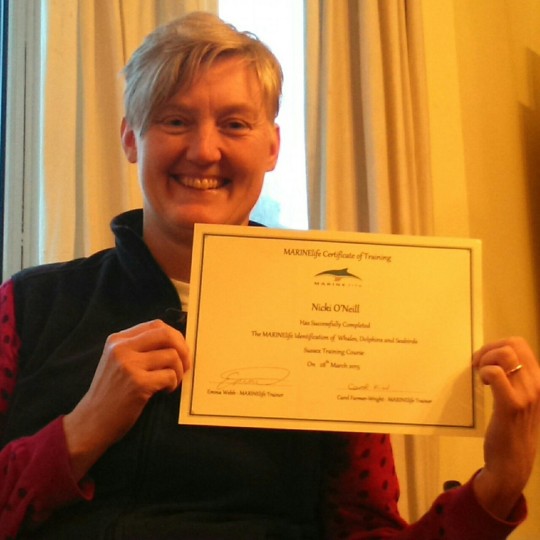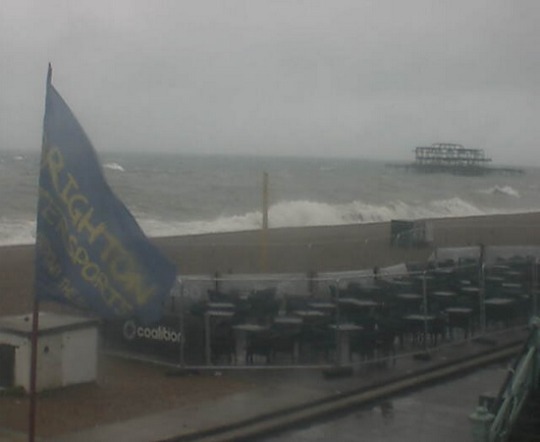Don't wanna be here? Send us removal request.
Photo

Proud of my MARINElife identification of Whales, Dolphin and Seabird certificate
3 notes
·
View notes
Photo

If one meditates on the Medicine Buddha, one will eventually attain enlightenment, but in the meantime one will experience an increase in healing powers both for oneself and others and a decrease in physical and mental illness and suffering.
—Lama Tashi Namgyal
134 notes
·
View notes
Photo

#westpier #brighton from Brighton Watersports webcam
1 note
·
View note
Photo



The land from the sea
1 note
·
View note
Photo

Bossiney Haven, my favourite place to swim
4 notes
·
View notes
Photo








Seaswimming adventure
1 note
·
View note
Photo

#2minutebeachclean #brighton beach this morning
1 note
·
View note
Link
Off into the bluesy-brownie-grayish-green sea
1 note
·
View note
Photo

Today I realised I am a little manic and have been taking on quite a lot recently. As a consequence I have also been in a great deal of pain again. As today is my day off I refocussed my mental energy into my driftwood gate and designing my insect hotel. The gate is coming along nicely. I just need a few more significant pieces of driftwood to complete it. So I will be out scouring the beach at the weekend. The completed gate will be at the entrance to my chicken run. Lucky chickens!
1 note
·
View note
Text
How to understanding someone with chronic pain
From: http://www.disabilitysanctuary.com/forum/index.php?threads%2Fhow-to-understand-someone-with-chronic-pain.9491%2F Chronic pain changes many things in life, most are invisible. Many people do not seem to understand chronic pain and its effects. Many people do not seem to understand that chronic pain sufferers have attempted numerous alternative therapies and know what therapies have worked or not worked for them. Some people have been misinformed or merely misunderstand. In the spirit of informing those who wish to understand: These are some things that can help you to understand, and help, people who suffer from often debilitating, chronic pain. 1 Remember that being sick does not mean that the sufferer is no longer a human being. Chronic pain sufferers spend the majority of their day in considerable pain. If one visits or lives with a chronic pain sufferer, the chronic pain sufferer may be unable to enjoy things they used to enjoy. The chronic pain sufferer remains aware, and desires to do what they used to perform. The chronic pain sufferer feels as if they are stuck inside a body over which they have little or no control. They still want to enjoy work, family, friends and leisure activities, however much pain puts that enjoyment out of reach. 2 Learn the code. Chronic pain sufferers will often talk differently from people free of constant pain. [1] A numeric pain scale is used as a quantitative measure for identification of intensity for pain so the doctors can measure effects of treatments. Description of pain on a scale measuring from 1 to 10, the 1 is "no pain at all, feel wonderful" and 10 is the "worst pain ever felt". Do not assume the chronic pain sufferer is not experiencing pain when they say that they are fine. The chronic pain sufferer attempts to hide the pain due to lack of understanding in others. Accept that words may be inadequate to describe how the sufferer is feeling. Recall a time when you experienced pain, then multiply the intensity and attempt to imagine that pain present twenty-four hours a day, every day, without relief. It's hard to find the words for that sort of pain. 3 Recognize the difference between "happiness" and "healthy". When you have the flu, you probably have felt miserable. Chronic pain sufferers have experienced pain from 6 months to many years. Pain has caused them to adopt coping mechanisms that are not necessarily reflecting the real level of pain they feel. Respect that the person who is in pain is trying their best. When the chronic pain sufferer says they are in pain - they are! They are merely coping; sounding happy and trying to look normal. Look for the signs of pain: grimacing, restlessness, irritability, mood swings, wringing of hands, moaning,sleep disturbance, teeth grinding, poor concentration, decreased activity, and perhaps even writing down suicidal thoughts or language.[2] 4 Listen. The previous two steps made it clear that chronic pain sufferers can speak in code or make light of their pain than is the reality. The next best thing that you can do is to listen to them properly, and to make it clear that you both want to hear what they have to say and that you really have heard it. Use your listening skills to decode what they're hiding or minimizing. Read How to be a good listener for more details on being a great listener. 5 Understand and respect the chronic pain sufferer's physical limitations. Being able to stand up for ten minutes doesn't necessarily mean that the sufferer can stand up for twenty minutes, or an hour, or give you a repeat performance whenever. Just because the person managed to stand up for thirty minutes yesterday doesn't imply that they will be able to do the same today. With a lot of diseases, a person may exhibit obvious signs of immobility, such as paralysis, or total immobilization due to weakness, etc. With chronic pain however, it is confusing to both the sufferer and the onlooker, and their ability to cope with movement can be like a yo-yo. The sufferer may not know, from day-to-day, how they are going to feel when they wake up and each day has to be taken as it comes. In many cases, they don't know from minute to minute. That is one of the hardest and most frustrating components of chronic pain. Insert "sitting", "walking", "thinking", "concentrating", "being sociable" and so on, to this step, as the curtailment on a sufferer's ability to be responsive applies toeverything that you'd expect a person in good health to be able to do. That's what chronic pain does to its sufferers. 6 Leave your "pep talk" mode for your kids and your gym buddies. Realizing that chronic pain is variable, keep in mind that pep talk can be aggravating and demoralizing for the chronic pain sufferer. As already noted, it's quite possible (for many, it's common) that one day they're able to walk to the park and back, while the next day they'll have trouble getting to the next room. Therefore, it's vital that you don't fall into the trap of saying: "But you did it before!" or "Oh, come on, I know you can do this!" If you want them to do something, then ask if they can and respect their answer. Get over the need to give platitudes about the value of exercising and fresh air. For a chronic pain sufferer, "getting out and doing things" does not make the pain vanish and can often exacerbate the problems. Bear in mind that you don't know what they go through or how they suffer in their own private time. Telling them that they need toexercise, or do some things to "get their mind off of it", may frustrate them to tears, and is not correct advice, especially if you're not medically trained and haven't got a clue. If they were capable of doing some things any or all of the time, they would. Remember that chronic pain sufferers are constantly working with doctors and striving to improve and do the right things for their illness. Another statement that hurts is, "You just need to push yourself more, try harder". Obviously, chronic paincan deal with the whole body, or be localized to specific areas. Sometimes participating in a single activity for a short or a long period of time can cause more damage and physical pain; not to mention the recovery time, which can be intense. You can't always read it on their face or in their body language. Also, chronic pain may cause secondary depression (wouldn't you get depressed and down if you were hurting constantly for months or years?), but it is not created by depression. 7 Never use throwaway lines. Assuming you know best by making such statements as "Ah well, that's life, you'll just have to deal with it", or "You'll get over it eventually. Until then, you'll just have to do your best", or worst of all, "Well, you look well enough", etc., are lines that might make you feel done and dusted with the topic but they are both a form ofdistancing yourself from the person and making the sufferer feel worse and out of hope.[3]Psychologist Mark Grant suggests that you throw lifelines rather than throwaway lines, by saying something like: "So how have you survived?"[4] Admit it when you don't have answers. Don't paper over your ignorance with platitudes or bold allegations not based on fact. There is no harm in saying "I don't know" and then offering to find things out. 8 Check your own patience. If you're impatient and want them to "just get on with it", you risk laying a guilt trip on the person who is suffering from pain and undermining their determination to cope. They probably have the will to comply with your requests to go out and about with them but have neither the strength nor the coping capacity as a result of the pain. A chronic pain sufferer may need to cancel a previous commitment at the last minute. If this happens, please do not take it personally. If you are able, please try to always remember how very lucky you are, to be physically able to do all of the things that you can do. Be very understanding if the chronic pain sufferer says they have to sit down, lie down, stay in bed, or take these pills right now. It probably means that they do haveno choice but to do it right now, and it can't be put off or forgotten just because they happen to be somewhere, or they're right in the middle of doing something. Chronic pain does not forgive, nor does it wait for anyone. 9 Be sensitive when suggesting medicines or alternative treatments. Prescription drugs, over-the-counter medicines and alternative therapies can have side effects and unintended consequences. Some may not appreciate suggestions, and it's not because they don't want to get well. They may have heard of it or tried it already or some may not be ready to cope with new treatment that can create an additional burden on their already over-burdened lives. Treatments that haven't worked carry the emotional pain of failure, which in and of itself can make the person feel even lower. Of course, if there were something that cured, or even helped people with a particular form of chronic pain, then they should be made aware of it. There is worldwide networking (both on and off the Internet) between people with chronic pain. Those can be good resources. Be sensitive in how you bring it up. On the other hand, never be afraid to ask them about how satisfied they are with their treatment. Mark Grant says that it is important to ask helpful questions about whether the chronic sufferer thinks their treatment is satisfactory or if they think their pain is bearable.[5] He suggests that people rarely ask these open-ended "helpful questions"that would help the chronic sufferer to open up and really talk. 10 Don't be put off if the chronic pain sufferer seems touchy. If that's the appearance, it's probably because they are. It's not how they try to be. As a matter of fact, they try very hard to be normal. Just try to understand. They have been going through a lot. Chronic pain is hard to understand unless you have had it. It wreaks havoc on the body and the mind. It is exhausting and exasperating. Almost all the time, they do their best to cope with this, and live their lives to the best of their ability. Just accept them as they are. 11 Be helpful. The chronic pain sufferer depends a great deal on people who are not sick to support them at home or visit them when they're too sick to go out. Sometimes they need help with shopping, cooking, or cleaning. Others may need help with their kids. They may need help getting to the doctor, or to the store. You can be their link to the "normalcy" of life. You can help them keep in touch with the parts of life that they miss and desperately want to undertake again. 12 Balance your career responsibilities. If you are living with a chronic pain sufferer or supporting such a person on a regular basis, you need to maintain balance in your life. If you don't take care of your own needs, health, and work-life balance, being around the chronic pain sufferer can bring you down even though you're probably trying hard not to be. Avoid suffering from carer burn-out by getting other people to help, taking time out, and curtailing your guilt trips. Care for this person as much as you're able but also care for yourself.
1 note
·
View note
Text
New year
I had a quiet and relaxing Christmas helped by the new medication regime my doctor put me on. We used the Christmas break to start me on a higher dose of gabapentin. This meant I was a little sleepy while I got used to the higher dose. Time will tell whether it helps me and with all things now I know I have to be patient.
It was lovely to have both our children with us on Christmas morning for breakfast and pressies. At the beginning of the new year we took our son to a family wedding in Ireland. I really enjoyed having some time with him to our selves. He enjoyed catching up with relatives and connecting with some of his cousins who are around the same age. I have enjoyed being back to work for a whole week now. I have implemented a new getting things done method which I think will help me keep my work priorities in perspective. I also think it will help me keep track on things in case the medication is still making me feel groggy.
I had my first sea swim of the new year today. Due to the horrible weather conditions it just has not been possible to safely swim since boxing day. Swimming today after such a long break just emphasised for me how much to cherish the opportunity to swim in the sea. The cold reminds me that I need to breath to survive, the soft air permeates every cell of my body. My body feels nourished and alive, all aches and pains are washed away. Then the cold starts to tell my toes and feet that I need to get out. The pebbles feel like glass shards as I exit the water and slip on my flipflops. My husband greets me with a hot drink and a robe to warm my body. I am soon back into warm clothes and feeling alive and well.
0 notes
Link
Sumer Is Icumen In - First Sea Swim of 2014
0 notes
Link
Boxing Day Swim
0 notes
Text
Boxing day sea swim
I cannot begin to explain how excited I was this morning. I fed my cats at 6am as usual, and once it was light I went and let the chickens out. I was stuck by the calmness of the morning. After a few days of crazy storms, with wind and rain everything was so quiet. To me quiet and calm could indicate a possible chance to go for a sea swim. I have not been able to go for a sea swim for a couple of week due to the bad weather conditions. So I checked the webcam on Brighton Sharkbait. Yes result! the sea looked reasonably calm. I felt jubilant and excited, and realised how much I had missed my swims. I ran upstairs to see if my husband was awake and prepared to come and spot me whilst I swam. While I waited for him to get ready I reflected on my previous swims this year and felt that today I would be truly grateful for the opportunity to swim in the sea. I would take this time today to be present for the whole experience. We cycled to the beach (5 mins of freewheeling). It was great to feel the cold air rushing around my face, and feel the rising anticipation as I pushed my bicycle onto the beach. The air was cold but the sun have started to shine. The sea was rising and falling with a 1-2ft swell, with the tide on the way out. The conditions were good and I slowly prepared myself to take the plunge. I no longer feel the cold as I get in, I guess my year long challenge has acclimatised my to the temperature. I am guessing it was below 10° today. As I swam I kept repeating to myself this moment, this moment , just this moment. After about 15mins I got out as I was beginning to feel the cold. I felt so energised, refreshed and alive and so grateful to be able to swim. Back at home I thawed my toes out in a warm shower and enjoyed a large slice of cake and a cup of tea.
Swim Eat Sleep
1 note
·
View note